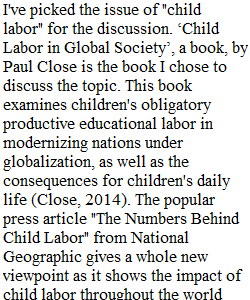


Q Have you ever watched or participated in a debate? Typically both sides in a debate are very passionate about their viewpoints. Have you ever taken a moment to try to understand what sources or evidence have helped the different sides formulate their thinking? Our views and opinions are formed by different experiences and perspectives. To be thorough in your research and achieve depth of understanding of a topic, you need to understand the varying perspectives of the debate. Different types of sources bring differing perspectives. From one type of source, you may understand the general public's viewpoints on a topic, while from another type of source, you may find more in-depth expert research on a topic. These perspectives are all valuable in understanding the complexity of an issue. Now it is your chance to explore all the different viewpoints on assigned topics. In this discussion you will complete a scavenger hunt of sources, and then consider each source's value to your own research. You should spend approximately 3 hours on this assignment. Instructions Choose the topic you wish to research for Modules 2 and 3. You may choose from the following topics: child labor, human trafficking, climate change and energy policy, OPEC, or space exploration. You will research this topic for all of the assignments and discussions in Modules 2 and 3. Learn the difference between scholarly and popular articles. Access the CCCOnline Library Databases to begin searching for sources. Try beginning your search in Academic Search Complete, as it is the widest searching, most complete database. However, you can search the more narrowly focused databases if you wish. For this discussion you will also need to search the internet for some sources, but please use the databases for as many as possible. Your goal is to find a wide variety of perspectives on your topic. For this discussion, you should find and read: One book (You may skim the book, finding the most important ideas presented.) One popular press article (A popular press article is one that is printed in a periodical intended for a general audience, such as Time, Newsweek, and National Geographic.) Two scholarly articles (A scholarly article is one that is printed in a journal intended for a specific, expert audience; one of these articles should come from a peer-reviewed journal.) One news source One internet source One non-traditional source (think about films, podcasts, TED Talks, etc.) Think: What voice do you hear in each of the sources you have found? Whose perspective does that voice represent? What does that voice add to your understanding of the larger conversation? Are some voices (sources) more credible than others? Are some voices more important than others? Write: In your initial post, you should list the sources' titles, authors, periodical titles, and publish dates as appropriate to each source. Consider the rhetorical situation for each source (think specifically about the audience and purpose), and discuss how the source adds to your deeper understanding of the conversation. What is the research value of each of these types of sources? Post one original post, and reply to at least two of your classmates. In your replies to peers, compare your valuations on the different perspectives. Discuss why you value one type of source over another, and try to help one another see the importance of each type of voice. Try to further the discussion in your replies by asking thoughtful questions, adding interesting information, or connecting your reply to the material we are discussing. Don't forget that your initial posting is due by the date listed in the Course Schedule. Please post over several days. Points will be lost if you post on only one day of the module.
View Related Questions